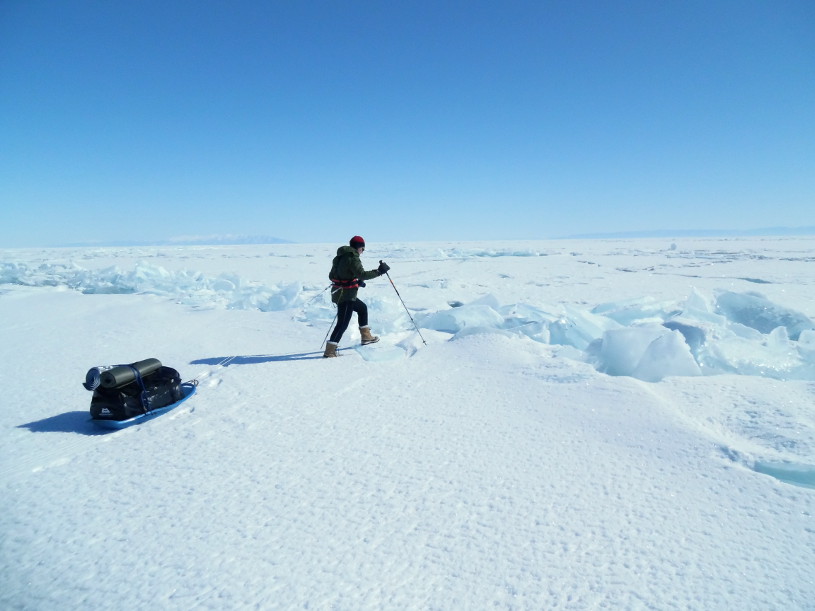
As we lay swaddled in our tent, a loud rumbling noise echoed around us. For several seconds it seemed the world was collapsing beneath us, until a decisive cracking sound ended the show, and we breathed again.
A couple of years ago, Laura and I spent a week walking across a frozen Siberian lake. Here is the full account of our trip, first published in The Kindness of Strangers.
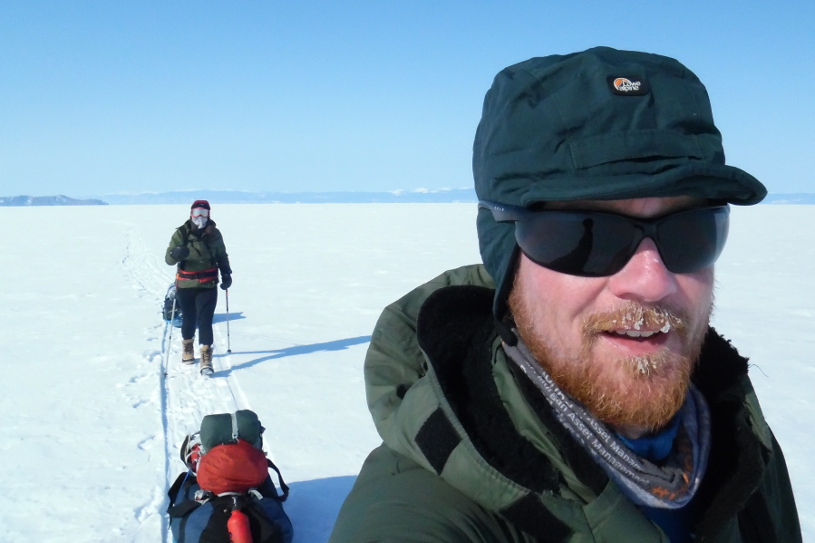
Father Baikal
We were suspended on a metre of ice, over the deepest part of the deepest lake in the world. It was –21ºC outside, we were three days’ walk from the nearest village and the lake had started to grumble at us. The straining ice was groaning beneath us and we had to trust it wasn’t going to give way. Moreover, our stove had just broken.
Father Baikal, as the lake is referred to by the local Russians, appeared to be irritated by our presence. The stove was our lifeline. We relied on it to melt snow for water. Although we could eat the bread, salami and chocolate we had with us, with nothing to drink, life would soon become very difficult.
The ice was too thick for us to break through to the lake beneath and our efforts to melt snow in bottles in the sun during the day or in our sleeping bags at night hadn’t been very successful. We lay in our sleeping bags, quietly wondering what to do.
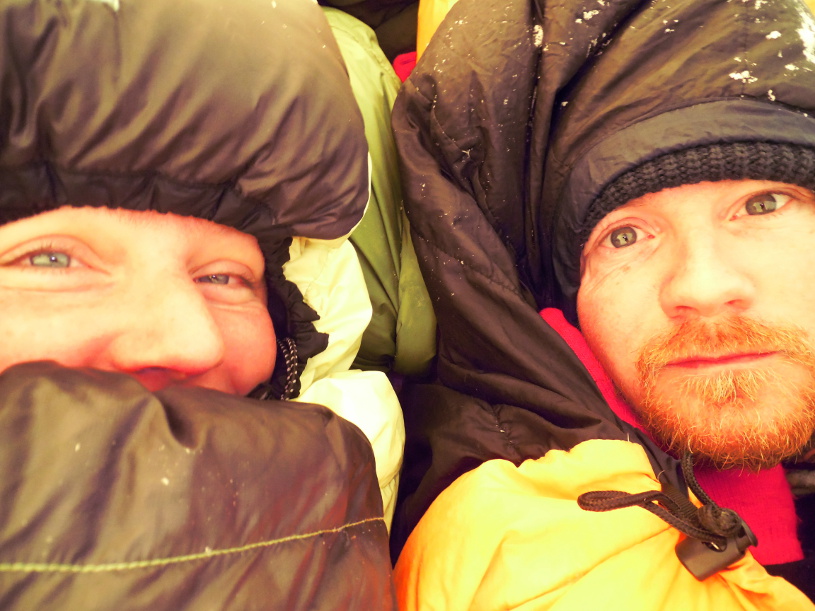
Adventuring as a married couple
The two of us have been on many adventures together since getting married six years ago. We’ve run ultramarathons and cycled around the world, crossed deserts on bike and foot, and wild camped in all conditions.
As a married couple, we make excellent expedition partners, knowing each other’s skills, strengths and limitations intimately. In times of stress – say, when a stove has broken in the middle of Siberia – we know what the other person will be feeling and understand instinctively how to avoid conflict which would make a difficult situation worse.
For this reason, we chose to lie there in silence, listening only to the noise of the ice settling around us as the temperature dropped. The plan for this expedition was to spend a week walking across frozen Lake Baikal, from west to east. We had been dropped off at the tip of an isolated peninsula halfway up the lake and planned to cross to the opposite shore and then back again in a large loop. We hoped to cover approximately 100 miles, carrying all our supplies and camping on the ice. We were expecting isolation, hardship and a physical challenge: in other words, the exact opposite of our office jobs back home.
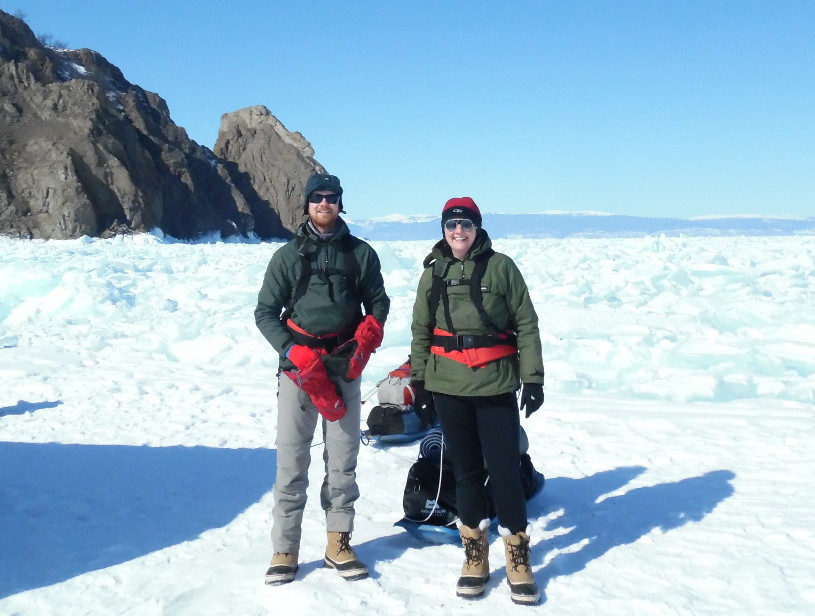
Bond villains
We had spent much of our journey to Siberia casting our fellow Russian passengers as James Bond villains. Russians are usually portrayed as the bad guys in Western media so it was easy to allocate roles for the people we encountered as henchmen, assassins and spies.
Even on the lake, we had set off at the same time as a group of three Russians who refused to return our smiles, thus confirming the stereotype. They were the only other people for miles around, and happened to be travelling across the lake in the same direction as us, but they clearly didn’t want our company. We spent the first day on the ice passing each other with nothing more than a curt nod.
Towards the end of that first day, when we were gradually becoming used to the fact we were walking on ice, the Russians stopped ahead and waited for us to catch up. As we drew level, the bear-like man who appeared to be their leader gestured to a patch of flat ice nearby. He indicated that they were about to set up camp and that we might do the same. We were tired and ready to call it a day, so we shrugged and started setting up the tent. Although we were still not on speaking terms with our neighbours, it was hard to believe their intentions could be sinister out here.
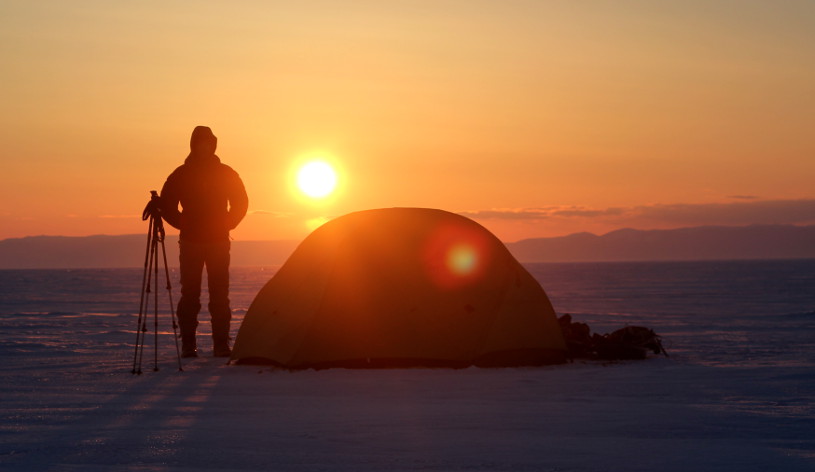
Disaster strikes
The following morning, with no words having been exchanged, we decided to try to separate ourselves from the Russians. We were after the wilderness experience and had not expected to see anyone else on the ice, nor intended to follow in others’ footsteps. This was about forging our own path, having our own adventure and learning how to cope with the extreme conditions in our own style. If we had wanted a guide, we would have found one.
After coffee and porridge, we packed up the sledges and stomped off across the lake. Travelling through snow is hard work. Although we occasionally found patches of bare ice, most of the lake’s surface was covered in a thin layer of snow. This meant that dragging the sledges created a lot of friction, so it felt like constantly being pulled backwards.
After a couple of hours, we found some old tyre tracks, where the snow was compacted and much firmer to walk on. The ice is thick enough in winter to support vehicles, meaning fishermen and tourists can drive across the lake, leaving tracks for skiers and walkers to follow. The harder surface made the going much easier, but the Russians clearly had the same idea because at lunchtime they caught up with us again. We might have been the only people out there, but we were destined to keep meeting each other.
As before, no smiles were returned, but the leader intimated a sign of thawing relations by handing us a piece of chocolate with a nod. That evening, we decided to camp close to the Russians again. Despite our wish for isolation, it was comforting to know that they were nearby, in this most alien of environments. This was when disaster hit and the stove stopped working.
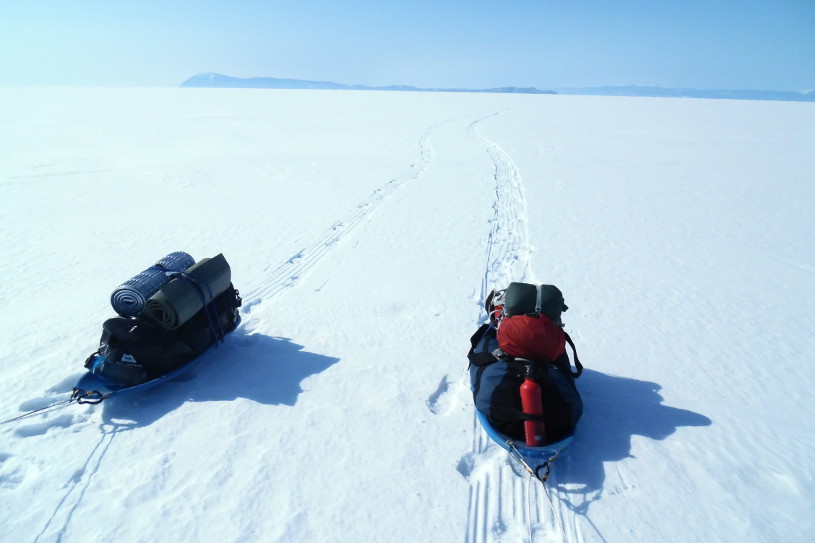
No stove, no water
We have used this stove hundreds of times, but nothing we tried could get it going. Tim sat down in the snow and took it apart piece by piece, replacing parts where we had spares and cleaning the rest, but the fuel pump still leaked and it didn’t maintain enough pressure to operate. No stove meant no water, so it was a worrying turn of events.
After a couple of frustrating hours, both cold by then, we took a pan of snow over to the Russians’ tent. They beckoned us in, put the pan on their kerosene heater and gave us a piece of salo, the cured pork that is a mainstay of the Siberian picnic. We discovered they were all academics from Novosibirsk and spoke basic English, so we talked about our planned journeys. They were planning to head north a few days later, diverging from our route.
We went to bed with full water bottles, but still anxious about the days ahead. The loud noises coming from the lake did not help with this anxiety, as we lay in our sleeping bags wondering where our next drink would come from.
One of the features of camping at low temperatures is that every drop of moisture freezes, accumulating as ice on the inside of the tent. Every exhalation, every bead of sweat contributed to an indoor snow canopy and meant that any small movement sent down a shower of ice crystals. This explains why, when we heard the Russians out and about the following morning, we greeted them with a string of expletives as we sat up in our sleeping bags and were immediately covered in a deluge of ice.
Despite the unconventional greeting, they offered to melt a pan of snow for us before they turned off their stove for the morning. Their leader, Alex, said they were aiming to camp on a peninsula that evening, a finger of land that stuck out into the middle of the lake. If we joined them, we could build a campfire to melt snow for water that night then assess our options from there.
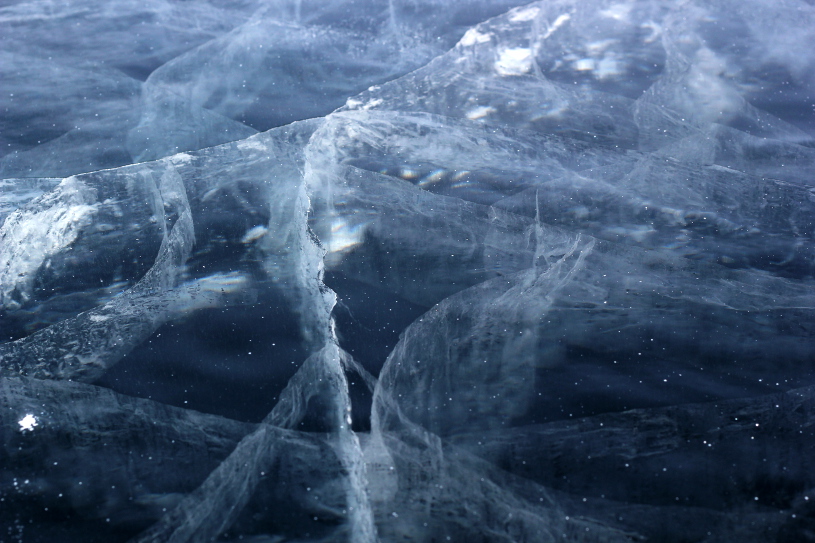
A crack in the ice
Heading back the way we had come would have been tough going without the ability to make water, so it seemed sensible to stick with the Russians for now. After a couple of hours dragging the sledges, we were feeling the effects of dehydration. The pan of snow Alex had melted for us was enough for coffee but no more, and the thirst was really beginning to kick in. Up ahead of us, we could see a long dark line, scarring the lake ahead of us. As we approached it, we realised that Father Baikal was looking out for us after all.
The scar was a lead – a crack in the ice that exposes the lake beneath. Although it had frozen over, the new ice was only a couple of centimetres thick, which meant we could break through and access fresh water.
When friends had asked us if we would be fishing through the ice, we’d told them that the last thing we would want to do when walking on the surface of a frozen lake was to smash a hole in it. However, sitting at the edge of the lead, smashing a hole in the ice was exactly what we needed to do.
Along with all the specialist lightweight camping equipment, we were also carrying a heavy metal hammer picked up from a hardware store in Irkutsk. We needed it to bang in the ice screws necessary for pitching our tent on ice, but it probably weighed as much as the tent itself so it was nice to find another use for it. After a few swings, a spray of fresh water indicated we had punctured the lake’s skin. We filled our water bottles, relieved, and treated ourselves to cold porridge – the breakfast we’d missed without water.
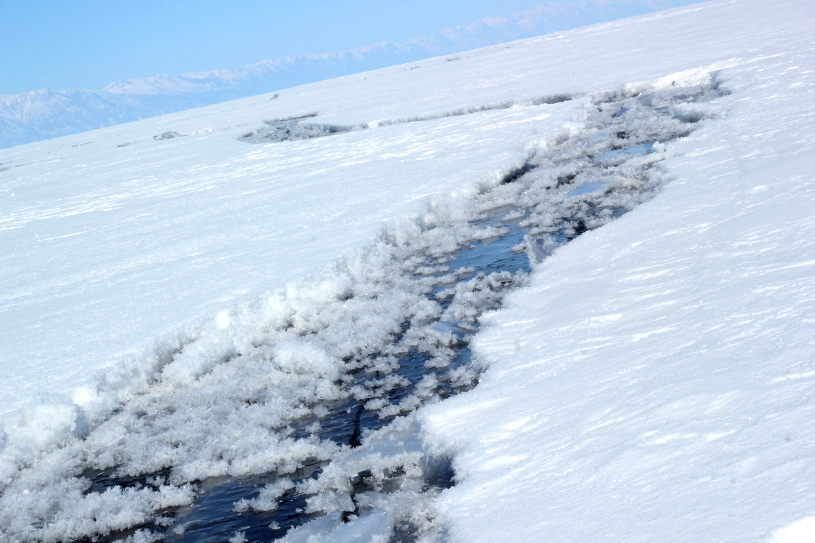
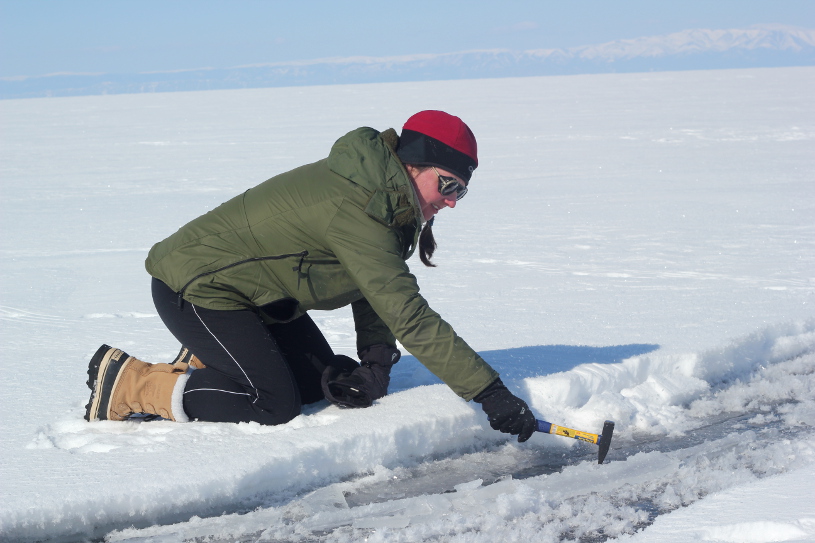
“She is Russian woman!”
By mid-afternoon we had reached the edge of the peninsula, where we waited for the Russians. Alex had camped there before so he took us to a good spot he knew with an area cleared for a fire and a wall built from snow blocks to shelter a tent from the wind.
Watching Laura haul her heavy sledge up the steep snow bank where the lake met land, Alex exclaimed ‘She is Russian woman!’
Coming from a burly Siberian, this was high praise.
We collected wood from the surrounding area and built a campfire, while Alex strung up a wire from which to hang cooking pots. We declined the offer to spend the night in their large tent, but gladly accepted the offer of meat stew for dinner.
After we’d eaten, the Russians produced a battered plastic bottle of spirit – apparently cognac – and there followed a series of toasts: to international friendship, to ‘British heroes’ (us), to ‘Russian heroes’ (them) and above all to Lake Baikal. We spent several hours around the campfire that night discussing everything from our views on Brexit to their memories of the large group outdoor activities that used to be encouraged by the socialist state.
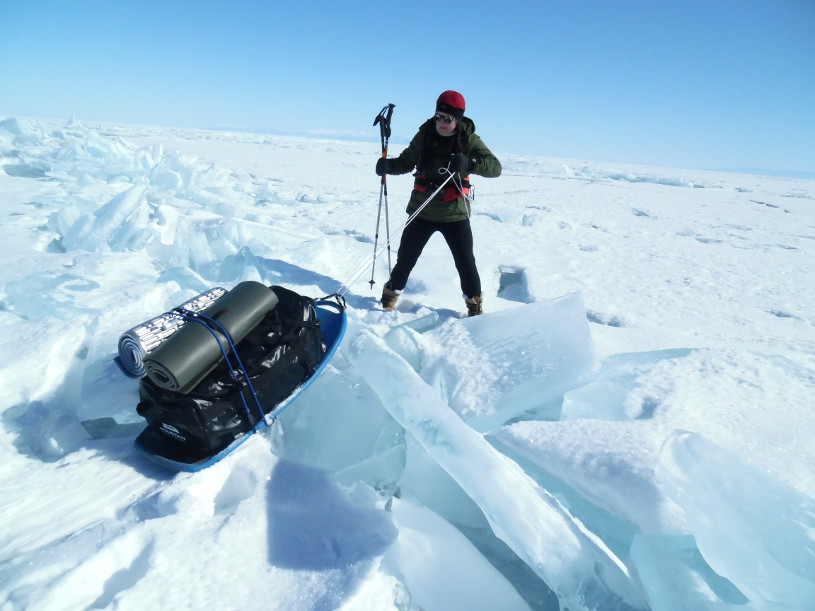
The plan
The following morning we woke to a cry of ‘British heroes, breakfast ready!’ as our unexpected hosts had risen early and prepared another stew. By this time we had devised a plan for continuing on our own: we would load our sledges with firewood which we could use to build a campfire again that evening and melt snow for water. That would allow us to reach the nearest town, two days’ walk from where we were.
Although we were nervous about starting a fire on the surface of our icy platform, we’d seen it done on a YouTube clip back at home and the Russians seemed unperturbed by the idea. It was time to say goodbye to our new friends and we pressed chocolate bars into their hands as a way of saying a small thank you for all of their help. We would have to work hard over the next two days as we knew we only had enough wood for one night’s camping and we still had a lot of miles to cover before we reached civilisation.
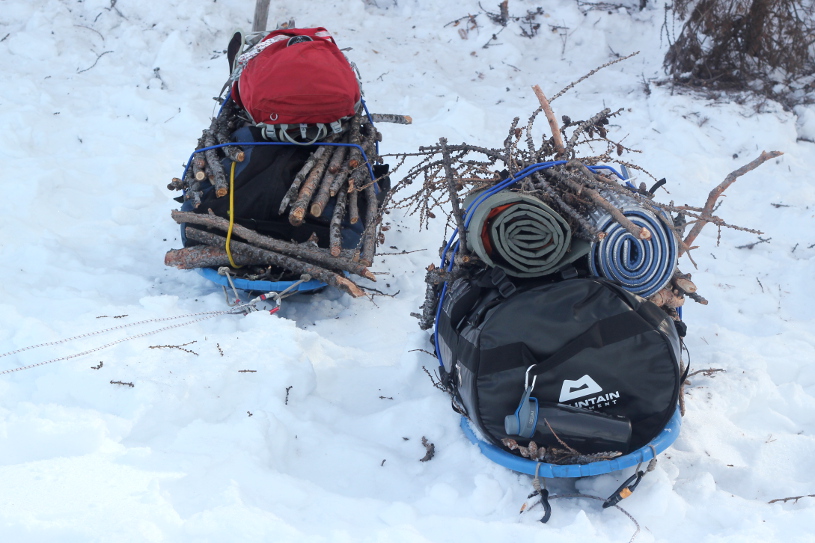
Fire and ice
We established a disciplined routine of walking for two hours before breaking for ten minutes, and repeated it until the sun went down.
Keeping the fire going that evening required all of Laura’s concentration, because the heat of the blaze melted the ice beneath it, which in turn doused the flames. However, we managed to melt enough snow for dinner and drinks the next day, even if the result was that everything smelled like woodsmoke for the rest of the trip.
We were tired by the time we reached the town the following evening after another day of marching. We wandered the streets aimlessly in search of accommodation for the night before hesitantly approaching a group of surly-looking fishermen in military fatigues.
Hearing our story, and the fact that we were English, they immediately broke into big grins and made us pose for a series of group photographs before they drove us to somewhere we could stay. We revelled in the warmth of our host’s banya and slept soundly in a proper bed, safe in the knowledge that water was now available on tap and there was no risk of drowning in our sleep. We had survived Lake Baikal.
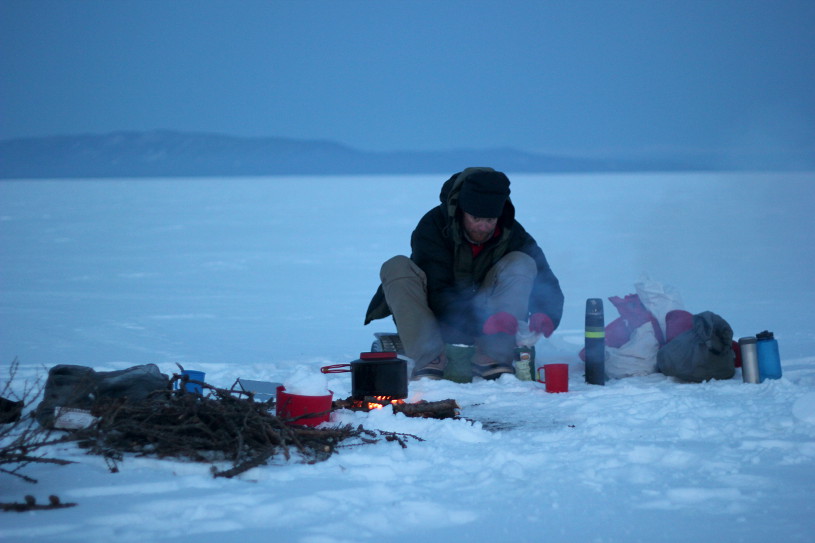
We had come to Siberia to get away from it all. We didn’t want, nor had we expected, company out on the ice, but our experience was all the richer for it. We wanted isolated wilderness, but discovered that the joy of travelling is in the people you meet – in this case, our Russian heroes.
Crossing Lake Baikal video
Route map
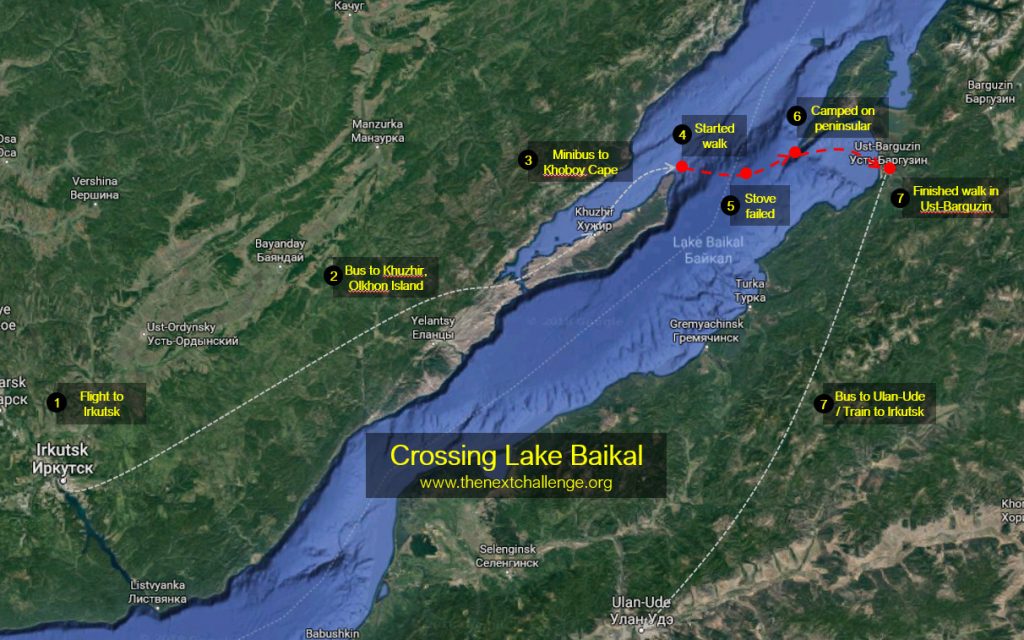
Special thanks
Our thanks go to the following people who supported our expedition:
- Blacks – for our toasty-warm, winter boots and accessories
- Outdoor Research – for the excellent Alti Mitts
- Cascade Designs (Thermarest) – for the RidgeRest camping mat
- Antony Jinman – for lending as some proper harnesses
- Summersdale – for publishing the Kindness of Strangers book
- EpicMakers – for producing the video above
What do you think? Please do add your thoughts below…